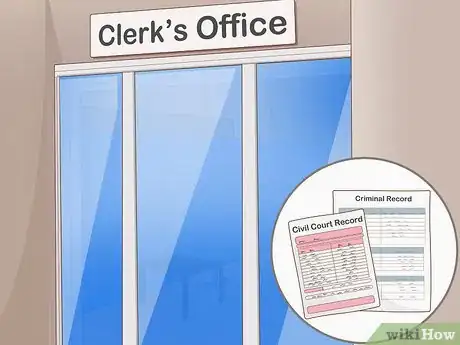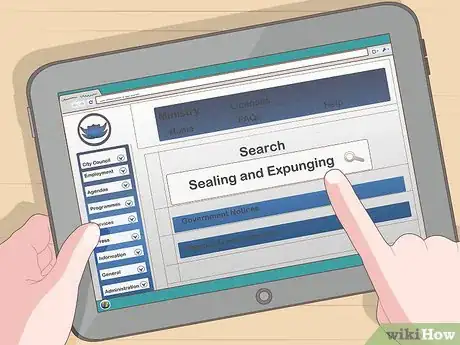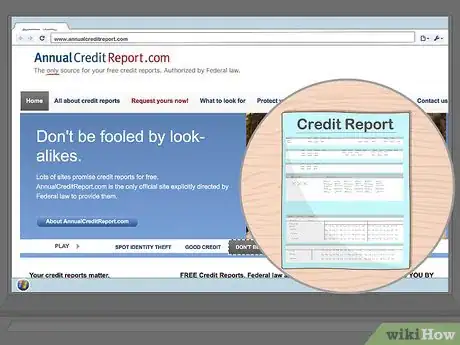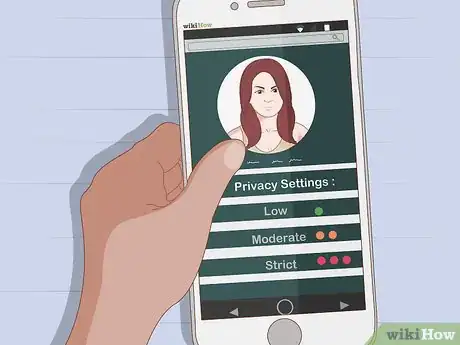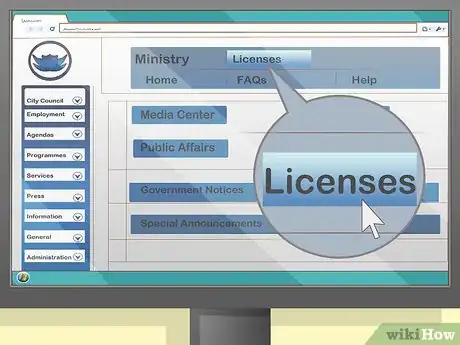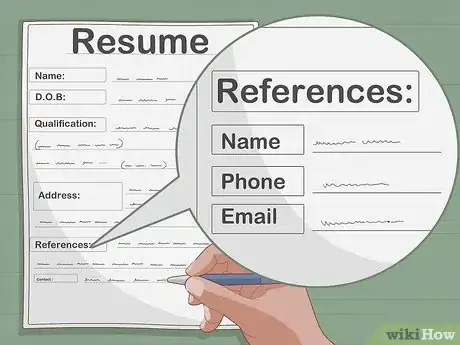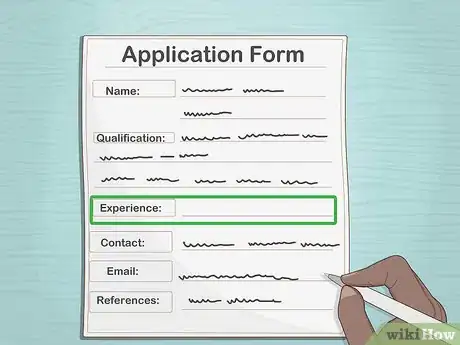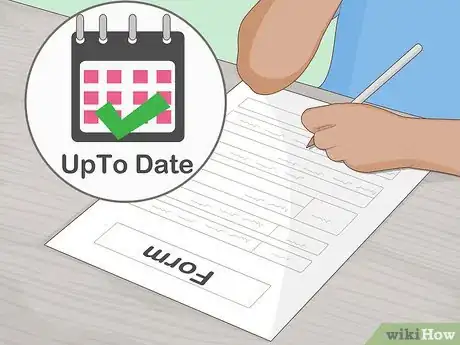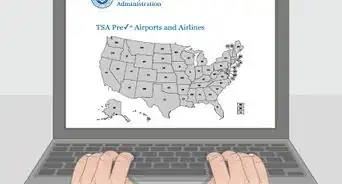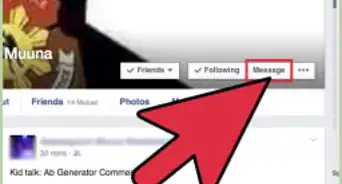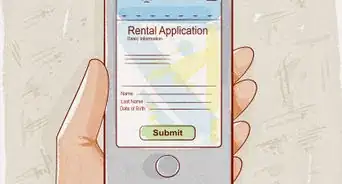This article was co-authored by Michael McCutcheon, PhD. Dr. Michael McCutcheon is a career coach, psychologist, and award-winning public speaker who specializes in procrastination elimination, goal achievement, and increasing life satisfaction. With a background as a counseling psychologist, he guides clients toward becoming more aware of their desires and anxieties to break old patterns, create new habits, and achieve life-changing results. He also helps clients improve organization skills, embark on a new career, get promoted, get admitted into graduate schools, and transition from school to the working world. He is a published author and lecturer in graduate psychology courses at New York University (NYU), a position he has twice won the Teaching Award (2014 & 2019). His work has appeared in the press as a lifestyle and career expert for The Washington Post/The Associated Press, The New York Post, Scholastic, Lifehacker, and The Coca-Cola Company. He has served as a contributing writer for Out Magazine and featured panelist on National Public Radio (NPR).
There are 9 references cited in this article, which can be found at the bottom of the page.
This article has been viewed 20,507 times.
Maybe you’re applying for a job and know that a background check is in the near future. It’s a good idea to verify your legal and financial records so that you know what information is out there. You should also know that you do have legal rights during this process. For example, you’ll get to see a copy of the report and have a chance to respond if there is any negative information. When going through a background check, it's important to be honest and provide accurate information.
Steps
Verifying Your Legal and Financial Records
-
1Get a copy of your criminal and civil court records, if you have been involved in a court case. This will apply to you if you have been arrested, sued, divorced, or involved in any other legal proceedings. If you live in the U.S., this process will vary depending on which state you live in. In most cases, the court clerk’s office should be able to help you. You can look at the website for your state’s judicial department and find the court where your case was filed.[1]
- You might have to pay a small fee for obtaining copies of the court records. This will vary depending on the court, as will the amount of time it takes to retrieve your records.
- Make sure that all information on these records is accurate.
-
2Look into having your record expunged. To have your record expunged means that a conviction or arrest will be wiped from your record. This is typically done if you were a juvenile when the event occurred, or if the arrest was made in error.[2]
- Records are also sometimes sealed, which means that the incident will not show up on a background check.
- Laws about sealing and expunging records vary depending on where you live. In the U.S., you can start by visiting your state’s website and using the search function to look for “sealing and expunging.”
Advertisement -
3Request a copy of your credit report. Your credit report contains information such as your name, address, how you pay your bills, how much money you owe, and whether or not you have ever filed for bankruptcy. Equifax, Experian, and TransUnion are the 3 major credit reporting agencies in the U.S. They are required to supply you with a free credit report once a year. You can order these reports online at annualcreditreport.com. [3]
- If there is an error, you can contact the reporting agency and ask them to correct it. You may be asked to provide supporting documentation.
Checking Your Personal and Professional Info
-
1Clean up your digital footprint. Your digital footprint is comprised of the information about you that is on the internet. Before the background check you should take some steps to learn what is out there and make any necessary changes.
- Google yourself. If your search turns up information that you don’t want out there, ask the site administrator to take it down. If it’s a post by a friend, ask them to remove it.
- Update your privacy settings by taking a look at all of your social media accounts and ensuring that you have the strictest settings applied.
- Don’t post things that you wouldn’t want a potential employer to see. For example, don't post extremely personal information, or engage in fighting with an internet troll.
-
2Verify your professional licenses and certificates. If your profession requires you to hold a license, check with the issuing agency to make sure that your records match theirs. This process will vary depending on which country or state you live in. In the U.S., you can typically go to your state’s .gov website to get started.[4]
- For example, if you live in Indiana, you would go to in.gov and click on the tab that says “License.”
- You can then see your options for requesting and viewing licenses.
-
3Update your reference information. If you choose to list references on your resume, make sure that you provide up to date phone numbers and email addresses. You should also have this information handy when filling out job applications. You don’t want to provide an out of date phone number and leave the prospective employer with a lack of information.[5]
- It is considered good form to give people a heads up if you are using them as a reference.
-
4Verify what will and will not be checked. You can be sure that your credit report and criminal record will be checked. However, many people worry that their political affiliation will keep them from getting a job. Don't worry, your credit report and court records will not reveal your affiliation. However, a potential employer might be able to find that information about you on social media, so take care with your posts. Also, in some states, that information is public record.[6]
- If you feel that you have been denied a job because of politics, you can contact that Equal Employment Opportunity Office (EEOC.gov). It is illegal to discriminate on this basis in the United States.
- A workers’ comp claim will not show up on your background check. In some states, these records are public. However, an employer cannot view them until after they have made you a job offer.
Applying Truthfully and Addressing Problems
-
1Be honest. Answer all questions and requests for information truthfully. If you lie on your application or resume, a thorough background check will reveal the discrepancies. A prospective employer might decide not to hire you if they know that you have been dishonest.[7]
-
2Provide complete answers. Make sure to fill in all sections of an application. If you leave something blank, a prospective employer might see that as a red flag. For example, if you are asked to provide your work history for the last 9 years, don’t just provide information for the past 5 years.[8]
-
3Make sure your information is up to date. Provide updated information in all fields. For example, if you recently left a job, make sure that you note the end date on your resume. You should also make sure that you update your resume to include your most recent degrees, awards, and promotions. Make sure to accurately state your current job title.[9]
-
4Be prepared to explain any negative information. If the employer is concerned about any information, be prepared to explain why it would not impact your ability to do the job.[10] For example, maybe you were arrested in college for a public disturbance. Explain that it was a youthful indiscretion and that you have matured.[11]
- It is illegal to refuse to hire someone based on certain information that may be revealed in a background check (such as political activity or national origin). If you feel that you have been discriminated against, contact the Equal Employment Opportunity Commission at EEOC.gov.
- An employer can legally refuse to hire you if your background check reveals information that would keep you from doing a good job. For example, if you apply for a job as a driver, but you've been convicted of vehicular manslaughter, the employer does not have to hire you.
-
5Review the background check. If you are not hired because of something that shows up in your background check, you have the right to ask the prospective employer for a copy of the report. They must also provide you with contact information for the agency that conducted the report. Look over the report carefully for incorrect information.[12]
- If something is inaccurate, contact the reporting company and ask them to fix it and notify the employer about the change. You will likely have to provide evidence of the error.
Expert Q&A
-
QuestionWhat should I do if I know I'm not going to pass the background check?
 Michael McCutcheon, PhDDr. Michael McCutcheon is a career coach, psychologist, and award-winning public speaker who specializes in procrastination elimination, goal achievement, and increasing life satisfaction. With a background as a counseling psychologist, he guides clients toward becoming more aware of their desires and anxieties to break old patterns, create new habits, and achieve life-changing results. He also helps clients improve organization skills, embark on a new career, get promoted, get admitted into graduate schools, and transition from school to the working world. He is a published author and lecturer in graduate psychology courses at New York University (NYU), a position he has twice won the Teaching Award (2014 & 2019). His work has appeared in the press as a lifestyle and career expert for The Washington Post/The Associated Press, The New York Post, Scholastic, Lifehacker, and The Coca-Cola Company. He has served as a contributing writer for Out Magazine and featured panelist on National Public Radio (NPR).
Michael McCutcheon, PhDDr. Michael McCutcheon is a career coach, psychologist, and award-winning public speaker who specializes in procrastination elimination, goal achievement, and increasing life satisfaction. With a background as a counseling psychologist, he guides clients toward becoming more aware of their desires and anxieties to break old patterns, create new habits, and achieve life-changing results. He also helps clients improve organization skills, embark on a new career, get promoted, get admitted into graduate schools, and transition from school to the working world. He is a published author and lecturer in graduate psychology courses at New York University (NYU), a position he has twice won the Teaching Award (2014 & 2019). His work has appeared in the press as a lifestyle and career expert for The Washington Post/The Associated Press, The New York Post, Scholastic, Lifehacker, and The Coca-Cola Company. He has served as a contributing writer for Out Magazine and featured panelist on National Public Radio (NPR).
Career Coach & Psychologist I'd be up front about it. I'd let them know whatever is on it is going to show up, and I'd write a letter explaining what happened. For example, if you were arrested and convicted of a crime, you might explain the circumstances, provide some mitigating factors, or talk about how you learned from the experience.
I'd be up front about it. I'd let them know whatever is on it is going to show up, and I'd write a letter explaining what happened. For example, if you were arrested and convicted of a crime, you might explain the circumstances, provide some mitigating factors, or talk about how you learned from the experience. -
QuestionHow do I keep something from showing up on my background check?
 Michael McCutcheon, PhDDr. Michael McCutcheon is a career coach, psychologist, and award-winning public speaker who specializes in procrastination elimination, goal achievement, and increasing life satisfaction. With a background as a counseling psychologist, he guides clients toward becoming more aware of their desires and anxieties to break old patterns, create new habits, and achieve life-changing results. He also helps clients improve organization skills, embark on a new career, get promoted, get admitted into graduate schools, and transition from school to the working world. He is a published author and lecturer in graduate psychology courses at New York University (NYU), a position he has twice won the Teaching Award (2014 & 2019). His work has appeared in the press as a lifestyle and career expert for The Washington Post/The Associated Press, The New York Post, Scholastic, Lifehacker, and The Coca-Cola Company. He has served as a contributing writer for Out Magazine and featured panelist on National Public Radio (NPR).
Michael McCutcheon, PhDDr. Michael McCutcheon is a career coach, psychologist, and award-winning public speaker who specializes in procrastination elimination, goal achievement, and increasing life satisfaction. With a background as a counseling psychologist, he guides clients toward becoming more aware of their desires and anxieties to break old patterns, create new habits, and achieve life-changing results. He also helps clients improve organization skills, embark on a new career, get promoted, get admitted into graduate schools, and transition from school to the working world. He is a published author and lecturer in graduate psychology courses at New York University (NYU), a position he has twice won the Teaching Award (2014 & 2019). His work has appeared in the press as a lifestyle and career expert for The Washington Post/The Associated Press, The New York Post, Scholastic, Lifehacker, and The Coca-Cola Company. He has served as a contributing writer for Out Magazine and featured panelist on National Public Radio (NPR).
Career Coach & Psychologist If you've got something on your record, it's going to show up. There isn't much you can do about that. However, you shouldn't assume that something from your past is automatically going to pop up. Different checks reveal different information. For example, a pre-employment background check is going to include criminal records, pending criminal cases, and things like your professional licenses. It won't reveal something like an eviction, for example. Every background check is different so never assume!
If you've got something on your record, it's going to show up. There isn't much you can do about that. However, you shouldn't assume that something from your past is automatically going to pop up. Different checks reveal different information. For example, a pre-employment background check is going to include criminal records, pending criminal cases, and things like your professional licenses. It won't reveal something like an eviction, for example. Every background check is different so never assume!
References
- ↑ https://www.jud.ct.gov/faq/courtrec.html
- ↑ http://www.fdle.state.fl.us/cms/Seal-and-Expunge-Process/Seal-and-Expunge-Home.aspx
- ↑ https://www.consumer.ftc.gov/articles/0155-free-credit-reports
- ↑ http://www.in.gov/pla/license.htm
- ↑ https://money.usnews.com/money/careers/slideshows/21-things-hiring-managers-wish-you-knew?slide=2
- ↑ https://www.monster.com/career-advice/article/worried-about-a-background-check
- ↑ Michael McCutcheon, PhD. Career Coach & Psychologist. Expert Interview. 24 February 2021.
- ↑ https://money.usnews.com/money/blogs/outside-voices-careers/2012/07/11/the-9-best-tips-for-submitting-an-online-job-application
- ↑ https://money.usnews.com/money/blogs/outside-voices-careers/2012/07/11/the-9-best-tips-for-submitting-an-online-job-application
- ↑ Michael McCutcheon, PhD. Career Coach & Psychologist. Expert Interview. 24 February 2021.
- ↑ https://www.eeoc.gov/eeoc/publications/background_checks_employees.cfm
- ↑ https://www.eeoc.gov/eeoc/publications/background_checks_employees.cfm
